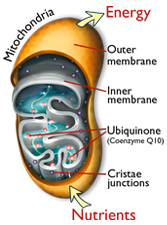A new study at Aarhus University Hospital (AUH) in Denmark may be able to show if a Q10 deficiency can possibly explain the long-term effects that develop in some COVID-19 patients. Pharma Nord has been asked to supply the medicine for the trial.
Highly diverse and diffuse symptoms may be a sign of a Q10 shortage in the mitochondria of the cells. Coenzyme Q10 is a vitamin-like compound with a key role in the cellular energy metabolism.
and diffuse symptoms may be a sign of a Q10 shortage in the mitochondria of the cells. Coenzyme Q10 is a vitamin-like compound with a key role in the cellular energy metabolism.
In Denmark, Pharma Nord is the only manufacturer that makes a licensed Q10 drug for preventing and treating Q10 deficiency.
For that reason, Pharma Nord has been asked by the Department of Infectious Diseases at Aarhus University Hospital (AUH) to supply the active preparation for their new study, which is the first study ever to look at long-term effects of COVID-19.
The study was mentioned in the Danish TV news (DR) on Friday, May 28, and is also featured in a bulletin on the news channel’s website dr.dk.
FIND OUT MORE ABOUT PHARMA NORD Q10
All Patients In The Study Will Be Testing Q10
Pharma Nord has donated the capsules with pharmaceutical-grade Q10 and the placebo capsules for the study, which is approved by the Danish Medicines Agency.
It is a so-called cross-over trial where all of the 120 patients will get either the active Q10 drug or placebo but in alternating time periods. Neither the doctors nor the patients know in advance who will be getting what and when.
All of the patients will receive active Q10 at some point during the study.
Not All Q10 Is The Same
In this study, the scientists will be looking closer at Q10’s effect on the mitochondria. Bio-Quinone Q10 is the only licensed Q10 drug in Denmark and is approved for preventing and treating Q10 deficiency.
It is manufactured using Pharma Nord’s patented method that guarantees good bioavailability of the Q10 raw material.

